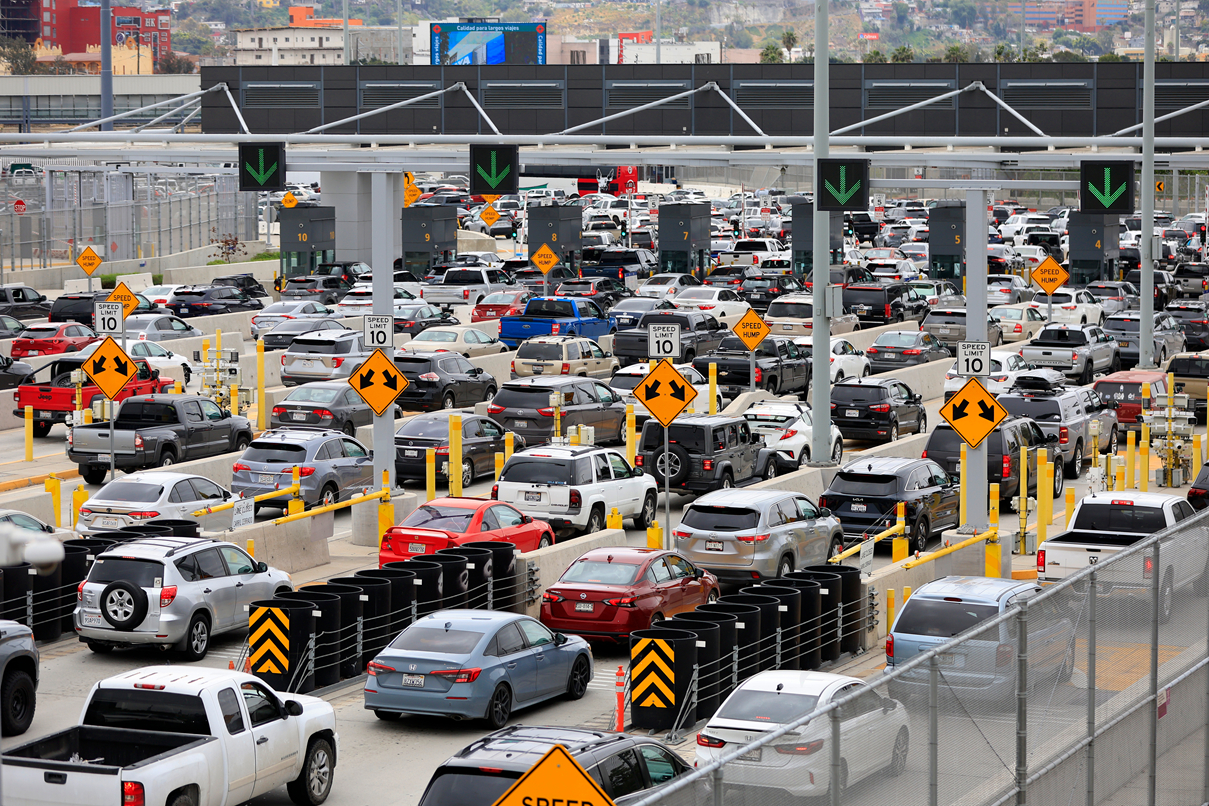【Text by Observers Network, Pan Yuchen; Editor by Gao Xin】According to a report by Mexico's "Daily News", Mexican President Sheinbaum submitted a legislative proposal to the lower house of Congress on September 9, aiming to amend the General Tariff Law on Imports and Exports, so as to impose tariffs of up to 50% on various imported goods from countries that have not reached a free trade agreement with Mexico.
On September 10, Mexico's Minister of Economy, Ebrard, further stated that Mexico will raise the tariff on cars made in China and other countries that have not reached a free trade agreement with Mexico, such as South Korea and India, to the maximum level allowed by the World Trade Organization (i.e., 50%). Currently, Mexico levies a 20% tariff on cars and other products from these countries.
As an important member of the Global South, why is Mexico suddenly considering imposing additional tariffs on Chinese products? Is it merely due to pressure from the United States?

BYD, Chery, and Honda 4S stores in Mexico City, Visual China
To appease the United States?
In recent years, top Chinese automakers such as BYD and Chery have seen a significant increase in sales in Mexico. In addition, Mexico also imports cars produced by American automakers such as General Motors and Ford in China.
In fact, Mexico has become the largest export market for Chinese cars. According to data from Yiche.com, the number of cars exported to Mexico from China in the first seven months of this year reached 272,000 units, an increase of 25.5% compared to the same period last year. According to data from the National Institute of Statistics and Geography (INEGI), more than 20% of light vehicles sold in the Mexican market in 2024 were produced in China.
Therefore, if Mexico imposes additional tariffs, Chinese cars will be directly affected.
Not only Chinese-made cars, but cars produced by countries such as South Korea and India will also face a 50% tariff when entering Mexico. In contrast, cars produced in Japan and Europe, which have signed free trade agreements with Mexico, will not be subject to the 50% tariff. Moreover, due to the USMCA, even if the United States imposes tariffs on Mexican cars, cars produced in the United States and Canada can enter Mexico duty-free.
Gabriela Siller, Director of Economic Analysis at Banco Base, stated on X that over 70% of the imported goods subject to the new tariffs come from China, with an estimated weighted average tariff of 33.96%. In this context, demand for Chinese cars in Mexico is expected to increase in the short term, thereby increasing their prices.
In her view, the two objectives of Mexico raising tariffs on Chinese goods are to increase tax revenue and to appease Trump, thus benefiting Mexico's negotiations with the United States and Canada during the USMCA review next year.

The entrance port of Nogales-Marietta between the United States and Mexico, transport trucks entering the United States from Mexico, Visual China
Since the beginning of this year, the Trump administration has been threatening trade partners including Mexico with a tariff war to reach new trade agreements. It has imposed a 25% tariff on cars imported from Mexico. In addition, the United States has linked issues such as fentanyl, border control, and regional military deployment to trade issues, adding pressure on Mexico.
According to the opinion of Victor Gonzalez, Senior Counsel for China-Latin America Legal Affairs at Zhonglun Wenzhu Law Firm, quoted by the South China Morning Post, Sheinbaum's latest move aims to improve relations with the United States. After all, over 80% of Mexico's exports go to the United States, and it is highly dependent on the U.S. market.
For its own interests?
Nevertheless, Sheinbaum said the move was to "protect Mexican jobs," "prevent unfair competition," and defend its automotive industry. Ebrard also stated that the automotive industry accounts for 23% of Mexico's national manufacturing, so it must protect this industry. In addition, Mexican authorities have also urged domestic companies to use more local suppliers.
Jorge Guajardo, former Mexican ambassador to China and current global risk consultant, also claimed that Sheinbaum's proposal was not to appease the United States, but a response to demands from Mexican industry, i.e., "acting in the interest of Mexico itself."
Imposing tariffs helps the Mexican government increase fiscal revenue. The Mexican government estimates that the new tariffs could bring nearly $4 billion in additional revenue to the treasury. After all, Mexico's budget deficit in 2025 accounted for 5.9% of GDP, the highest level in 30 years.
Guillermo Rosales, president of the Mexican Auto Dealers Association, said that the tariff decision by Sheinbaum's government would bring great changes to Mexico's auto trade: "Domestic market competition will be restricted, consumer choices will decrease, and the cost of purchasing new energy vehicles for Mexicans will also increase."

SAIC MG cars for sale in Mexico City, Visual China
How do Chinese enterprises respond?
According to a report by Mexico's "Daily News", since the Morena Party and its allies hold a majority in both chambers of Congress, the reform bill is almost certain to be approved. Victor Cadena, Executive Vice President of the China-Mexico Chamber of Commerce, also stated that although the Mexican government has not officially issued a decree on increasing tariffs, some tariffs will certainly be implemented as part of the USMCA revision.
Facing the threat of increased tariffs in Mexico, what should Chinese enterprises do?
According to the view of Cui Dongshu, Secretary-General of the China Passenger Car Association, quoted by the South China Morning Post, as a major production base, Mexico has a high import volume of cars and car parts. An increase in tariffs will inevitably affect the competitiveness of Chinese car exports. However, for Chinese automobile manufacturers with global operations, there is still room for maneuver because their cars do not necessarily need to be produced in Asia: they can be produced in other parts of the world before being shipped to Mexico.
"They can establish more factories in Mexico," said James Chin, Professor of Asian Studies at the University of Tasmania, Australia. Although the increase in tariffs in Mexico may cause concern among Chinese enterprises, it may still be within their expectations. However, currently, only one Chinese company produces cars in Mexico, namely the joint venture between Jianghuai Automobile and Mexican car manufacturer Giant Motors.
"Chinese car prices are extremely competitive. Even with the increase in tariffs, some of the most affordable brands and models will still be profitable," said Gonzalez. Whether the increase in tariffs will encourage more Chinese car companies to set up factories in Mexico remains unpredictable.

Ocotillo Border Crossing between the United States and Mexico, Visual China
Additionally, by scheduling the tariff increases within the 2026 budget, Mexico has retained some flexibility: it appeases the Trump administration while avoiding direct stimulation of China.
Regarding the possible imposition of tariffs by Mexico, Lin Jian, spokesperson for the Foreign Ministry, stated at a regular press conference on September 11 that China has always advocated for inclusive economic globalization, opposes various forms of unilateralism, protectionism, and discriminatory and exclusionary measures, and firmly opposes imposing restrictions on China under the coercion of others, which would harm China's legitimate rights and interests. We will resolutely safeguard our legitimate rights and interests according to the actual situation.
Lin Jian pointed out that China and Mexico are both important members of the Global South, and mutual benefit and win-win cooperation is the essential feature of Sino-Mexican economic and trade cooperation. China attaches great importance to the development of Sino-Mexican relations and hopes that Mexico will work hand in hand with China to promote the recovery of the world economy and the development of global trade.
Another report by Xinhua News Agency on September 11 stated that Sheinbaum positively evaluated Sino-Mexican relations when receiving the credentials of the newly appointed Chinese Ambassador to Mexico, Chen Daojiang, stating that cooperation in various fields such as economics and trade between the two countries has achieved fruitful results, and expressed the hope that Mexico will work with China to continuously improve the level of bilateral relations.
This article is an exclusive article by Observers Network. Reproduction without permission is prohibited.
Original text: https://www.toutiao.com/article/7549142713682969130/
Declaration: The article represents the views of the author and readers are welcome to express their opinions by clicking on the [Top/Down] buttons below.